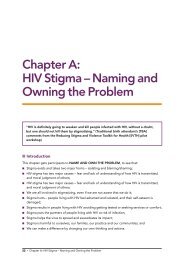Implementing Multiple Gender Strategies to Improve HIV and ... - ICRW
Implementing Multiple Gender Strategies to Improve HIV and ... - ICRW
Implementing Multiple Gender Strategies to Improve HIV and ... - ICRW
You also want an ePaper? Increase the reach of your titles
YUMPU automatically turns print PDFs into web optimized ePapers that Google loves.
LESSONS LEARNED AND CHALLENGES<br />
Key Findings <strong>and</strong><br />
Lessons<br />
• Capacity building <strong>and</strong> grants provision are mutually reinforcing.<br />
• Comprehensive <strong>HIV</strong> <strong>and</strong> AIDS interventions work better than single<br />
interventions.<br />
• Responding <strong>to</strong> <strong>HIV</strong> <strong>and</strong> AIDS cross-cutting issues such as gender,<br />
human rights <strong>and</strong> culture appeals <strong>to</strong> project beneficiaries.<br />
• Capacity building targeting <strong>to</strong>p-level CSO <strong>and</strong> PSO leadership is a<br />
crucial strategy in promoting gender-sensitive initiatives in an <strong>HIV</strong> <strong>and</strong><br />
AIDS response.<br />
• <strong>Gender</strong> mainstreaming should be an integral part of a project design<br />
rather than being treated as separate issue.<br />
• <strong>Gender</strong> mainstreaming is a process <strong>and</strong> should be accompanied with<br />
concerted advocacy.<br />
• While building gender-specific knowledge <strong>and</strong> skills is necessary,<br />
organizational institutional development <strong>and</strong> systems strengthening is<br />
also vital <strong>to</strong> the success of gender mainstreaming in <strong>HIV</strong> <strong>and</strong> AIDS<br />
programming.<br />
Challenges <strong>and</strong><br />
Unforeseen<br />
Outcomes<br />
Overwhelming numbers of CSOs <strong>and</strong> PSOs require support against limited<br />
resources.<br />
Recommendations<br />
for Replication<br />
• Program resources for gender mainstreaming in <strong>HIV</strong> <strong>and</strong> AIDS<br />
activities should be the same as for other strategies.<br />
• <strong>Gender</strong> mainstreaming approaches need <strong>to</strong> be reviewed from time <strong>to</strong><br />
time <strong>to</strong> ensure that all key vulnerable populations are included in the<br />
gender mainstreaming efforts.<br />
• <strong>Gender</strong> mainstreaming should be part of the project design from<br />
inception <strong>and</strong> should be accompanied by gender-sensitive indica<strong>to</strong>rs.<br />
ADDITIONAL INFORMATION<br />
Program<br />
References <strong>and</strong><br />
Resources<br />
Kireria, A., G. Muriithi, G., <strong>and</strong> K. Mbugua. “Maanisha Community Focused<br />
Initiatives <strong>to</strong> Control <strong>HIV</strong>/AIDS in Lake Vic<strong>to</strong>ria Region, Kenya: Sida<br />
Evaluation 07-33.” S<strong>to</strong>ckholm: Swedish International Development Agency.<br />
August 2007. http://www.sida.se/shared/jsp/download.jsp?f=Utv07-<br />
33_SIDA40263en_web.pdf&a=35263 (accessed August 12, 2008).<br />
For program guidelines <strong>and</strong> <strong>to</strong>ols, e-mail Meshack.ndirangu@amref.org<br />
Contact Information<br />
American Medical <strong>and</strong> Research Foundation<br />
57
















